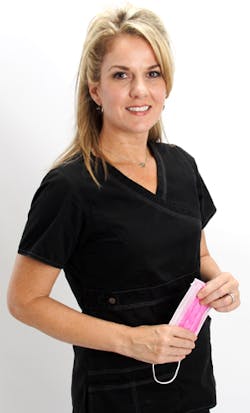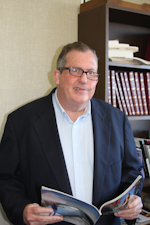Kim Morgan chats about finding jobs in dental assisting profession
Kimberly Morgan, RDH, is a fixture in dental assisting in the Central Texas area. She co-owns training center for dental assistants, Dental Essentials School of Dental Assisting, which has been in operation in Austin, Texas, since 2003. In 2015, she launched a website, YourDentalConnect.com, to help match dental assistants with jobs. The website now has more than 1,000 members.
A 24-year veteran of dentistry, Morgan started as a dental assistant after being trained by the Red Cross in Heidelberg, Germany, at an U.S. Army dental clinic. After three years as a dental assistaint, she pursued a dental hygiene degree. In addition to overseeing the training of dental assistants and practicing as a dental hygienist, she is a clinical trainer for Acteon, which manufactures a variety of technological products for the dental profession.
DentistryIQ recently interview her about her career and the dental assisting profession.
DentistryIQ: As a long-time dental hygienist, you opened up a dental assisting school and later a website. What prompted you to concentrate on the education of future dental assistants rather than as a dental hygiene educator?
Morgan: I wanted to target future dental assistants because I have such respect for dentistry and feel like it's important to try a field out before making a huge financial and time commitment in earning a degree. This way, students can try this profession out and continue on with their education if they wish.
Starting at an entry level position in dentistry also gives you the foundation and knowledge that one finds helpful in furthering their education in this field. I have found that hygienists who were previously dental assistants have a deeper understanding of the restorative side of dentistry. They can explain to the patient the details of different restorative procedures. They can also catch early signs of decay and failing restorations better. After all, they were the dentists' right-hand man.
DentistryIQ: You started out as a dental assistant 24 years ago, trained through the military. What have been some of the more exciting changes to have occurred within the dental assisting profession since you started out?
Morgan: Major changes have definitely taken place in dentistry in the past 24 years. The ones I am most excited about are computers, intraoral cameras, digital x-rays, and the Cerec milling machine. The technology is amazing, especially how we rely on computers today.
Many offices have gone paperless, so we use dental software to chart a patient’s mouth, create a treatment plan, email an insurance claim, and schedule the patients' appointments all in just a couple of clicks. I remember how time consuming these tasks used to be. We are much more efficient now because of computers.
Also, the employee and job search on the computer is starting to replace the traditional search for jobs in the Sunday paper classifieds. I started a dental employment website to allow employers and employees with specific needs and interests to find each other on a website specifically designed to connect them. By posting your resume or applying to the online job board makes finding employment easier.
Another change is the intraoral camera. They help us tremendously. There are some that can even detect caries. Capturing an image of a patient's cracked tooth helps with both patient acceptance and insurance payment. I used to just hold a hand mirror up and show them their teeth. They could barely see the posterior issues I was pointing out. Having a magnified picture of the patient's teeth on a computer screen helps with patient education and case acceptance.
Another advancement in dentistry are digital x-rays. I have to admit that I was really excited about this change. It was time consuming to take a FMX, then develop and mount the x-rays for the dentist. The sensor makes it a breeze now. Patients love that it's 85% less radiation and more comfortable than the traditional x-rays. Mounting is automatic, so again a time saver. And, no more cleaning the developer and rollers weekly or changing out the solutions.
Last, but not least, another major change is having the ability to make a crown in a single appointment. Cerec machines are amazing. We don't have to worry about making temps and then crossing our fingers that the temporaries will stay on those three weeks while their permanent crown is being made by an offsite dental lab. Less time in the chair makes for a happier patient! These changes have made it better for both patients and dental assistants.
DentistryIQ: Your employment agency also concentrates on finding jobs for dental assistants. What are some of the key points that a potential dental assistant should remember when interviewing with a dental office about a job?
Morgan: I have always encouraged my dental assisting graduates to research the dental office they are interviewing at. The more you know about that office the better you are prepared for the interview. It is as simple as looking at their website and seeing what kind of dentistry they do, the staff bios, the location, and other neat things you may find out.
It always impresses the interviewing dentist when the candidate for the assistant position asks, "I noticed that you do veneers here. How many cases do you do a month?"
Another tip is to dress the part. Look like you work there. Many of my graduates have gone on their interviews with their neatly ironed scrubs and have landed a working interview right then and there and were able to show off their skills and land that job.
Another recommendation is to bring copies of resumes and references along with a notepad. Have questions written down, so you don't forget the important things you want to discuss. Use the notepad for notes about the office and expectations they may have, so you can look over them later.
What are the days, hours, benefits, duties discussed at the interview? Many times, we are so nervous, we forget half the conversation. Above all, I tell my students to just relax and remember that they are interviewing the prospective employer as well. This mindset tends to take the pressure off.
DentistryIQ: Are most of your dental assistants seeking employment in traditional practice settings or with larger group practices such as DSOs? Why?
Morgan: I encourage my graduates to apply to either setting. Larger group practices may offer a wider range of experience with multiple dentists or specialists. I started my dental assisting career at an army dental office where I assisted a periodontist, prosthodontist, oral surgeon, and, of course, a general dentist routinely. This cross-training made me more marketable later on in my career. The more experience one receives the better.
The solo practice can feel more like family. I find that you build deeper relationships with your patients, since it's a smaller patient load.
However, either practice type is great to start with. In the end, it all depends on what the assistant is looking for. Many practices offer different types of pay ranges including benefits and bonuses, to different schedules, and duties required.
It's like trying on shoes, you will find some that fit perfectly, and others that are just not right for you. Trust your instincts, you will know when you find the right fit!
This article first appeared in Dental Assisting & Office Manager Digest. To receive enlightening and helpful articles for assistants and office managers in this monthly e-newsletter, visit dentistryiq.com/subscribe.







